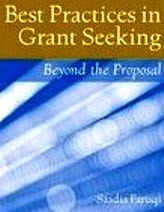Many grant writers ask me, how can we create a culture of collaborative grant seeking? Why is the burden of writing and submitting proposals on the grants department? How can we work collaboratively with other departments instead of alone as a grant writer? Well, it may take a while to get to the point where things go smoothly, but holistic grant seeking is not that difficult to implement in little steps. Here are some suggestions:
- Be involved from the start of program development. Give advice to program staff and senior management about what outcomes should be measured, how collaborators should be chosen, and the like. They should listen only because you are in a good position to know what funders’ requirements are going to be down the road.
- As a grant writer you may be in danger of not being aware of what’s going on - say in far-out locations, and many times you may not connected with your organization’s clients in a real way. So once a year do some program audits… go through the program and meet clients for a day or two to motivate yourself and increase your knowledge about the issues being faced by clients as well as by front line program staff.
- Start meeting regularly with program staff, and put these meetings on everyone's calendar to ensure that they become a accepted habit. The purpose of these meetings is to help improve the flow of information on an ongoing basis and sharing of challenges, so that you are not scrambling come proposal time.
- Encourage program staff to send you wish lists of their expenses on an ongoing basis as well. This will allow you to match grant opportunities with expected expenses, rather than the other way around. The wish lists can be sent via email or brought to the regular meetings mentioned above.
- Keep in the loop with organizations that partner with yours. Keep in mind who you can collaborate with in writing a proposal, and have those discussions going throughout the year, rather than when a deadline is looming. Sometimes the grant writers of partner agencies can help each other in reviewing and editing proposals as well.
- Solicit feedback from funders, and inform your senior staff and program directors about that feedback. This should not be feedback about your proposal but rather about programs – how do our outcomes look? Should we be doing things differently? How can we improve results? As long as you are not asking these questions when a proposal is due, most program officers should not have any problem giving you free advice.
- Finally, although reporting is so important for future funding, yet grant writers and even more so program directors fail to remember it expect when it’s time to report to a funder. Ask your program staff to send you key indicators on a regular basis… how many clients served each month, any milestones reached, etc. You can set up monthly email reminders, or even have those discussions at your program meetings.
By implementing these steps one at a time, over the course of a year or so, your organization can become much more holistic in grantseeking than before. Remember to discuss things before hand with your supervisors and program directors so that you don't face resistance when things start changing.





No comments:
Post a Comment